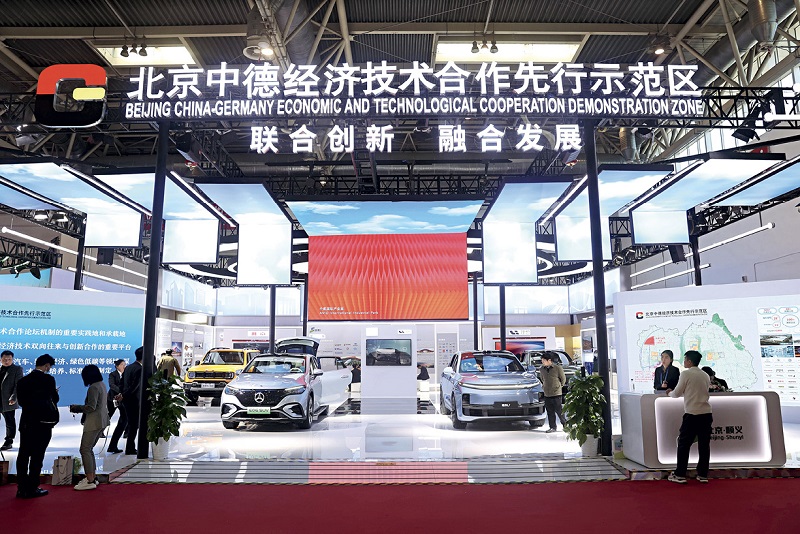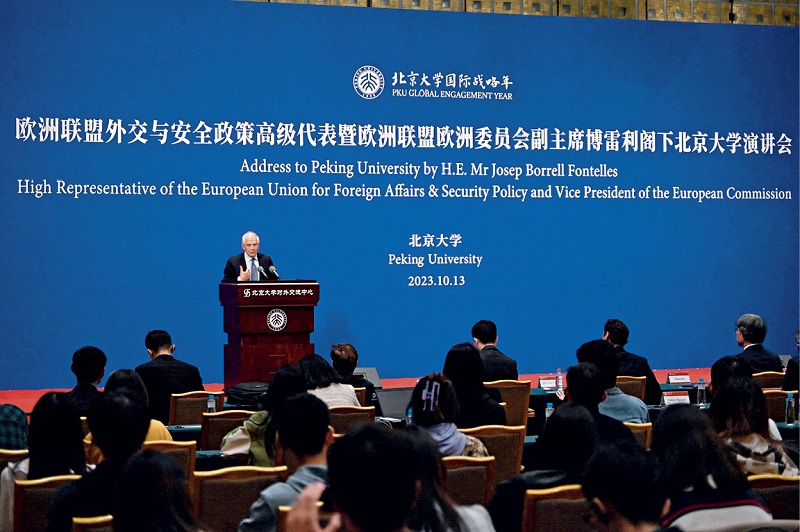
Vehicles are on display in the Beijing China-Germany Economic and Technological Cooperation Demonstration Zone at the First China International Supply Chain Expo in Beijing on November 29, 2023.
As the world is undergoing tremendous and profound changes, the China-EU comprehensive strategic partnership has continued for two decades. The two sides have established more than 70 cooperation and dialogue mechanisms with huge common interests. Their daily trade volume averages US $2.3 billion and investment stock has exceeded US $250 billion. However, the two sides are also facing various predicaments such as constant economic and trade frictions and declining political mutual trust. In addition to this are intensifying regional and international turmoil and the urgent need for improvement of the global governance system. With such an increasingly complex environment, both sides need to make clear judgments on some fundamental issues so that they can continue to overcome obstacles and build consensus, and always keep pace with the times while learning from their successful experiences.
First of all, both sides need to realize that whether China-EU relations will keep progressing is not only a matter of mutual interest, but will also largely determine the direction of global development. China-EU relations have maintained an overall upward momentum over the past 20 years. In addition to achieving tangible economic and trade benefits, the two sides have established institutional cooperation in areas such as strategic planning, economy and trade, people-to-people exchanges, green development, digital transformation and high-level dialogues. Bilateral relations have been maintained on the track of continuously building mutual trust and expanding cooperation. However, changes in the situation during recent years have caused some estrangement and misunderstandings, which have affected mutual trust and cooperation. For example, since defining China as a partner, competitor, and systemic rival in 2019, EU has wavered in its policy toward China, becoming more hesitant than before or even replacing cooperation with competition. If this state of uncertainty and instability on the EU side continues, it may result in a setback in China-EU relations.
Second, whether China-EU economic relations will remain open and cooperative is a major issue that has a bearing on the development prospects of both sides and the well-being of their people. Close and mutually beneficial economic and trade cooperation is the ballast stone of China-EU relations. The huge volume of trade and investment between the two sides and the large number of jobs created as a result are the manifestation of their common interests. However, during the process of geopolitical transformation, the EU has begun to interpret and define China-EU economic and trade cooperation as political and security issues, and put forward “de-risking” as one of the goals of its policy toward China. Consequently, the EU has continuously imposed trade remedies, investment reviews, import and export limitations, and technical restrictions on China. These actions have eroded the confidence of enterprises on both sides in maintaining and expanding cooperation, as well as brought a cloud over the economic and trade field that was full of vitality.
Finally, both sides should consider whether they should cooperate as equals on the basis of independence or compete with and confront each other as vassals of great powers. This is a fundamental question that both sides must answer in the face of international changes. Facing competitive pressure from the U.S., China has waged unyielding resistance and defended its rights to uphold its independent diplomacy and its own right to development. However, based on the so-called “values-driven alliances,” the EU has from time to time demonstrated its support for and alignment with the U.S. policy in handling relations with China. This has confused and dissatisfied China.

EU High Representative for Foreign Affairs and Security Policy Josep Borrell Fontelles delivers a speech at Peking University in Beijing on October 13, 2023.
In China’s view, this is not the way to get along with strategic partners, not to mention one of the world’s largest economies. The EU could have done more to achieve the strategic autonomy it has proposed, had greater autonomy in issues about its own development and security, and gained greater development space in the process of forming a multipolar international pattern, without relying on the so-called external protection and handing over its destiny to a great power.
The 24th EU-China Summit held in December 2023 resumed in-person exchanges between both parties and provided clear answers to these questions. First of all, both sides clearly signified their commitment to cooperation and non-confrontation, and China-EU relations are expected to continue to move forward. Given the changes in current global affairs, China believes that China-EU relations are essential to global peace, stability, and prosperity. If China and the EU choose dialogue and cooperation, bloc confrontation will be out of the question; if the two sides choose peace and stability, there will be no new Cold War; if both sides choose opening-up and win-win cooperation, global development and prosperity stand a chance. In order to shoulder their enormous responsibilities, China and the EU need to improve their perception of each other and formulate sound policies. “We should not view each other as rivals just because our systems are different, reduce cooperation because competition exists, or engage in confrontation because there are disagreements,” Chinese President Xi Jinping said on December 8, 2023 at a meeting with Charles Michel, president of the European Council, and European Commission
President Ursula von der Leyen, during the 24th China-EU Summit in Beijing.
Second, while managing competition and differences, the leaders of both sides affirmed to stay committed to openness and mutual benefits, to oppose decoupling, and to resolve differences appropriately through dialogue and consultation. On issues such as supply chain security, fair competition, overcapacity, and industrial and scientific and technological cooperation, after communication within the China-EU summit and high-level economic and trade dialogues, the EU has changed its rhetoric regarding China as a risk origin, and solemnly promises that it has no intention of escalating the current anti-subsidy investigation against Chinese products into a trade war. As long as China and the EU continue to implement the consensus they reached at the summit and continuously optimize the policy environment, the close cooperation between the world’s two largest economies will be able to provide a strong impetus for economic globalization and recovery of the world economy.
Finally, the two sides reached a clear consensus on further developing and consolidating China-EU relations into an equal partnership of real strategic significance that is “not targeted at, dependent on, or subject to any third party.”
During his visit to China and his participation in the high-level strategic dialogue with China in October 2023, EU High Representative for Foreign Affairs and Security Policy Josep Borrell asked China to believe in Europe's independence. In fact, China has long attached importance to and developed China-EU relations from the strategic perspective of two major forces promoting multipolarity, two major markets supporting globalization, and two major civilizations advocating diversity, and has always supported European integration and European strategic autonomy in policies and actions. While asking China to treat it as an equal, the EU also needs to truly respect the other side and work toward the same direction. As long as China and the EU adhere to these strategic consensuses, keep in step with the times, and continue to enhance mutual trust, they will be able to ensure the prosperity and stability of both sides. 
CUI HONGJIAN is a professor at the Academy of Regional and Global Governance at Beijing Foreign Studies University.